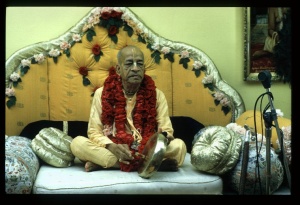CC Madhya 20.145 (1975)

A.C. Bhaktivedanta Swami Prabhupada
Below is the 1996 edition text, ready to be substituted with the 1975 one using the compile form.
TEXT 145
- vyāmohāya carācarasya jagatas te te purāṇāgamās
- tāṁ tām eva hi devatāṁ paramikāṁ jalpantu kalpāvadhi
- siddhānte punar eka eva bhagavān viṣṇuḥ samastāgama-
- vyāpāreṣu vivecana-vyatikaraṁ nīteṣu niścīyate
SYNONYMS
vyāmohāya—to increase the illusion and ignorance; cara-acarasya—of all living entities, moving and nonmoving; jagataḥ—of the world; te te—those respective; purāṇa—the supplementary Vedic literatures called the Purāṇas; āgamāḥ—and Vedas; tām tām—that respective; eva hi—certainly; devatām—demigod; paramikām—as supreme; jalpantu—let them speak about; kalpa-avadhi—until the end of the millennium; siddhānte—in conclusion; punaḥ—but; ekaḥ—one; eva—only; bhagavān—Supreme Personality of Godhead; viṣṇuḥ—Lord Viṣṇu; samasta—all; āgama—of the Vedas; vyāpāreṣu—in the dealings; vivecana-vyatikaram—to collective consideration; nīteṣu—when forcibly brought; niścīyate—is established.
TRANSLATION
“‘There are many types of Vedic literatures and supplementary Purāṇas. In each of them there are particular demigods who are spoken of as the chief demigods. This is just to create an illusion for moving and nonmoving living entities. Let them perpetually engage in such imaginations. However, when one analytically studies all these Vedic literatures collectively, he comes to the conclusion that Lord Viṣṇu is the one and only Supreme Personality of Godhead.’
PURPORT
This is a verse from the Padma Purāṇa.